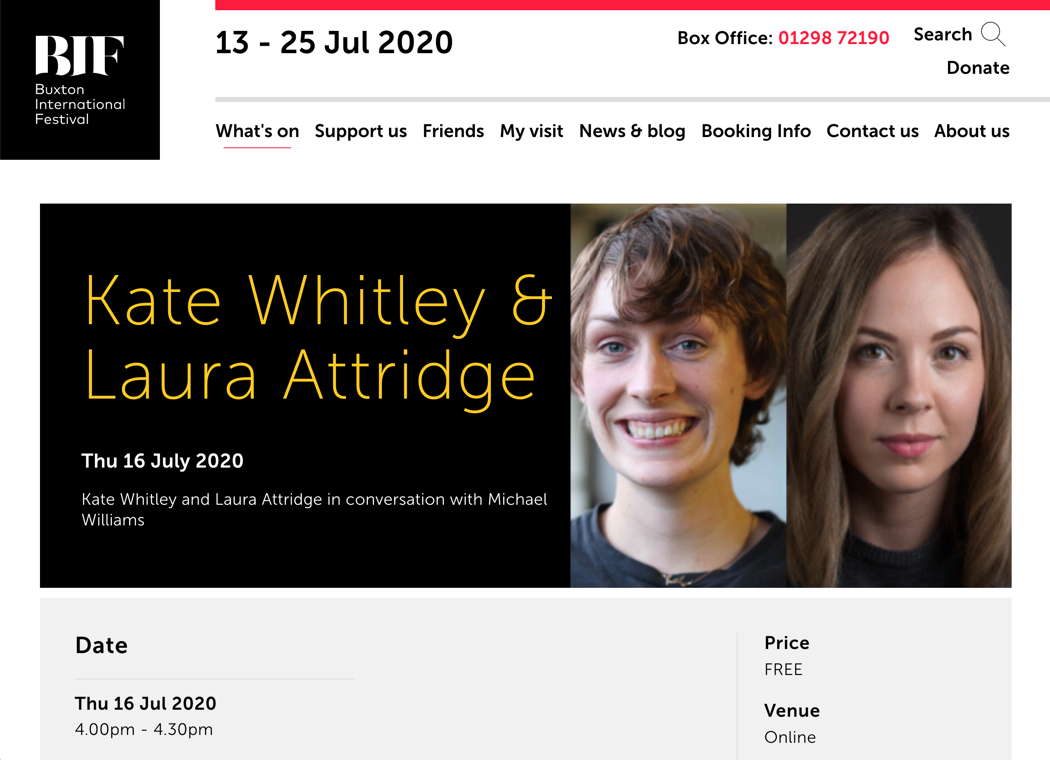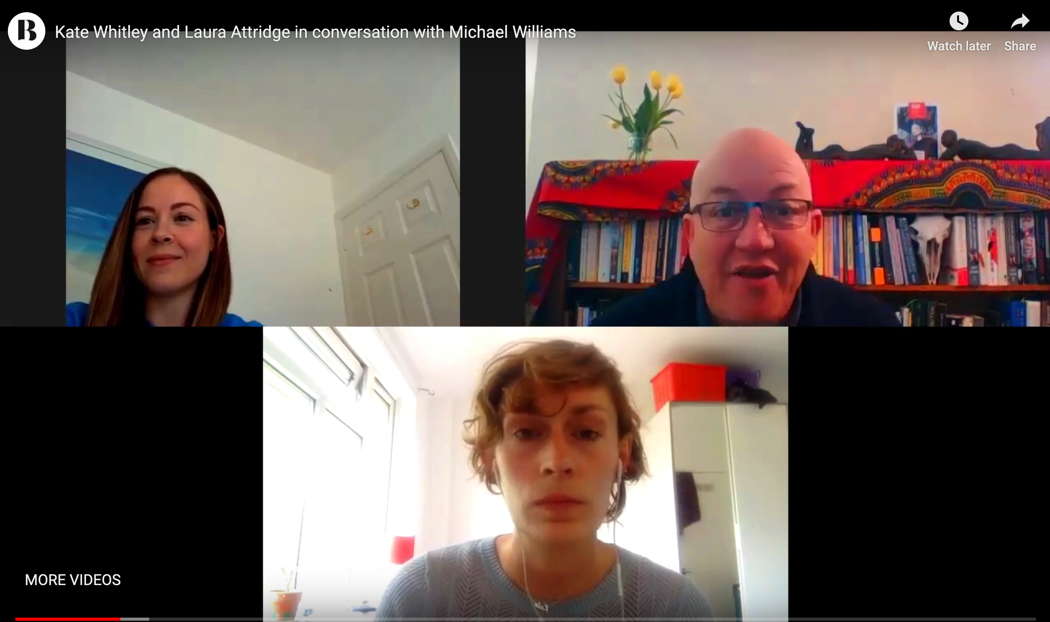- Luis Gerardo Guevara Viteri
- Haenssler Classic
- Ida Haendel
- Franz Dimler
- Hogwood
- Caracas
- Phillip Ying
- Helene Bresslau Schweitzer
 UPDATES: There's a new feature every day at Classical Music Daily. Read about the various ways we can keep in touch with you about what's happening here.
UPDATES: There's a new feature every day at Classical Music Daily. Read about the various ways we can keep in touch with you about what's happening here.
 CENTRAL ENGLAND: Mike Wheeler's concert reviews from Nottingham and Derbyshire feature high profile artists on the UK circuit - often quite early on their tours.
CENTRAL ENGLAND: Mike Wheeler's concert reviews from Nottingham and Derbyshire feature high profile artists on the UK circuit - often quite early on their tours.
Perspectives: Words and Music
MIKE WHEELER watches Buxton Festival's film 'Kate Whitley and Laura Attridge in conversation with Michael Williams', discussing the creation of the opera/oratorio 'Our Future, In Your Hands'
Our Future, In Your Hands is an opera-oratorio commissioned by the Buxton Festival from librettist Laura Attridge and composer Kate Whitley, and whose premiere had been scheduled for 10 July 2020. Tackling the subject of climate change, it is laid out for a youth choir of a hundred voices divided into two groups, orchestra and three soloists.
In his introduction, the festival's Chief Executive, Michael Williams, mentions, among Whitley's other work, the orchestral piece Sky Dances, written in 2018, to be performed in Trafalgar Square by the London Symphony Orchestra conducted by Simon Rattle. 'How many people were there?' he asks. 'I don't know - thousands' is her disarmingly laid-back reply. Williams then outlines Attridge's work as both a poet and opera director, drawing attention to her post-graduate vocal studies at the Royal College of Music, and how this fed into her understanding of the relationship between words and music.
What were Whitley and Attridge's first thoughts on being approached? For Whitley it was a dream commission. She has addressed the subject before, and the new work approaches it from a young people's point of view. Attridge's response is very similar. The commission reflects the times we are living in, and she too has done a lot of work with young people.

Buxton Festival online publicity for 'Kate Whitley and Laura Attridge in conversation with Michael Williams'
How did they find their way into the topic? Attridge looked at the scientific information and coverage of recent protests, while being more interested in creating a piece that works primarily on an emotive level. She points out that campaigner Greta Thunberg puts the emotional case centre-stage, then urges listeners to do their own research. Whitley's response to the text echoes that approach. 'Music is not the best medium for conveying technical information', so the emotive response is foremost. The work is laid out for two children's choirs, three soloists, representing the elements of earth, sky and water, and orchestra.
Williams mentions the fact that the Buxton Festival is creating a one-hundred-strong youth choir, which was keen to be involved. What had Whitley and Attridge learned from working with young voices? For Whitley, working with one choir of primary-school children and one of secondary age was 'a massive learning curve'. Her score involves a lot of repetition to aid memorability, and the range of the voice parts was an important consideration, leading to her intriguing comment: 'luckily I'm a really bad singer and can only sing quite low, which is basically the same as most kids. If I can sing it it's probably going to be OK.'
What do the soloists represent? For Attridge, the commission offered the possibility of laying out a narrative in a more abstract way than in opera. The singers take on multiple roles, and represent something larger than just a body on a stage. The movements involving all the performers create a beginning, middle and end, which resemble 'the whole earth speaking'. The soloists become voices of the elements, with one aria each. Attridge wanted to bring immediacy to their contributions, so two relate direct experiences of climate change direct, while the third is an astronaut witnessing earthrise 'and the perspective that gives you'. Giving the soloists different perspectives is something she found 'really exciting'.
Asked about the range of the solo voices, Whitley lists them as soprano, mezzo and bass. 'No tenor!' exclaims Williams, prompting another disarming admission: 'I always find tenors really hard to write for'. How did she plan the scoring? By going to the piano first. This, she says, is helpful for the kids, since 'they can feel supported by something that really works as a piano part'. Williams comments 'most of the composers I have worked with tend to go straight for the orchestration', then describes them being pulled up short by his request for a piano score for rehearsals. Whitley is a pianist herself, but is able to bear in mind the orchestral sounds she's after.

A still frame from the Buxton Festival film 'Kate Whitley and Laura Attridge in conversation with Michael Williams''
Williams invites Attridge to read an excerpt from her libretto. She picks the final tutti movement, 'The World Awakens', which perhaps glimpses 'a little bit of hope for the future'. Did she see something in her head as she wrote? No, she replies. She focused on the flow of text, testing out lines to see if they work with the breath. Whitley reinforces the point. The spacing and rhythm of the words give you 'an outline of what the melody might be'. Attridge occasionally heard rhythms in her head, 'but often the composer finds a version that is so much more interesting than me reading. Every time I read it differently'.
Williams asks: what were their experiences of oratorio? What impact did they have? 'I've no idea' says Whitley at first, but when Attridge remembers singing Vivaldi's Gloria at school a few times, Whitley recalls a performance of John Adams' El Niño on London's South Bank: 'that was really cool', with its contrast between the massed voices and soloists.
We end with a recording of the final section, to the words we've already heard Attridge read, which Whitley is currently putting together, with players from the Multi-Story Orchestra, which she co-founded in Peckham, south London; the soloists, not credited, but presumably those originally engaged: soprano Fiona Finsbury, mezzo-soprano Rhiannon Doogan and baritone Edward Robinson; and some children's voices, though most of them had still to be brought in. The music has a directness that reflects the verbal imagery of constant renewal, and I look forward to hearing the complete work which, on this evidence, will surely make its intended effect.
Copyright © 21 July 2020
Mike Wheeler,
Derby UK

FURTHER INFORMATION: BUXTON FESTIVAL


